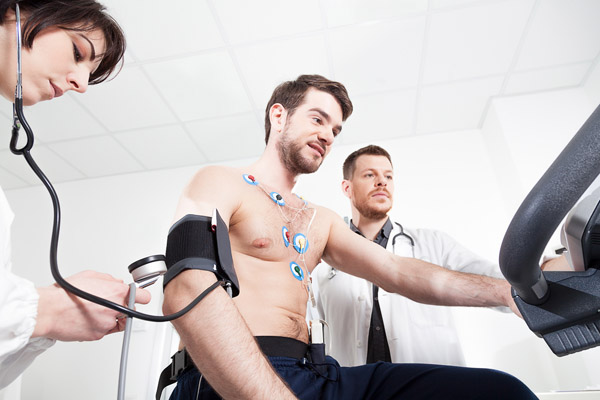Cardiac Stress Test: A Key Tool for Heart Health

Maintaining good cardiovascular health is essential to living a long and active life. One important tool that cardiologists use is cardiac stress tests to assess their patients' heart function. This stress test can provide valuable insights into how well your heart works if you have experienced symptoms of heart disease or need to evaluate your cardiovascular fitness.
An overview of cardiac stress tests
A cardiac stress test is a non-invasive medical test that helps cardiologists evaluate how a patient's heart performs during physical exertion. The purpose of the cardiac stress test is to determine how well the patient's heart pumps blood when it is working harder than usual. Cardiovascular exercise makes the heart pump harder and faster, which can help indicate if the patient is having issues with how the heart pumps blood to other parts of the body.
The cardiologist can identify cardiovascular abnormalities by observing changes in the heart's electrical activity during exercise. Common conditions include:
- Arrhythmias
- Angina
- Shortness of breath (dyspnea)
- Congenital heart disease
- Congestive heart failure
- Coronary artery disease
- Heart valve disease
- Hypertrophic cardiomyopathy
A cardiac stress test may also benefit people who want to determine if they are healthy enough to start exercising or work in high-risk occupations—such as pilots or professional athletes.
What to expect during a cardiac stress test
Before the test
From start to finish, a cardiac stress test typically takes about an hour, including prep time and doing the actual test. Before the test, the cardiologist will ask the patient questions about their medical history, how often they exercise, and how intense said exercise is. This helps the doctor decide how much the patient can exercise during the test and listen to their heart and lungs to check for any existing cardiovascular issues that may affect the results of the cardiac stress test.
During the test
The test typically involves the patient walking on a treadmill or pedaling on a stationary bike. If the patient cannot exercise, the cardiology team will give them medicine through an IV, which creates the same effect of exercise stress on the heart. The cardiology team will place sticky patches (electrodes) on the patient's chest to record the heart's rhythm, sending the results to a computer. This part of the test is known as an electrocardiogram (ECG), which shows or prints the test results as it progresses.
The pace of the exercise will be easy at first and gradually intensify. Most cardiac stress tests aim to raise the patient's heart rate to a target level. However, the patient can stop the test at any point if they are uncomfortable or develop the following symptoms:
- Moderate to severe chest pain
- Shortness of breath
- Unusually high or low blood pressure
- An irregular heart rhythm
- Dizziness
- Fatigue
The cardiologist may also stop the test if they are concerned about the patient's heart's behavior during it.
After the test
After the cardiac stress test, the patient will need to stand still or lie down for a few minutes, allowing their heart rate to return to its resting state. The cardiologist will watch for issues as the patient's heart rate and oxygen levels recover from the exercise. Most patients should be able to return to their usual activities unless the provider tells them otherwise.
The results of the stress test will help the cardiologist plan or change the patient's treatment plan. If the results reveal that the patient's heart is working well, they will likely not need to undergo more tests. However, if the test suggests the patient has underlying cardiovascular issues, the cardiologist may recommend further testing, such as a nuclear stress test or an echocardiogram. These tests provide more details about how the patient's heart works.
Schedule a cardiac stress test today
A cardiac stress test is an essential tool for diagnosing and managing heart health. It offers a safe and effective way to detect potential cardiovascular issues. If you have been experiencing symptoms of a heart-related issue or have risk factors for heart disease, call our office to schedule a cardiac stress test.
Request an appointment here: https://floridapremiercardio.com or call Florida Premier Cardiology at (561) 325-6495 for an appointment in our Delray Beach office.
Check out what others are saying about our services on Yelp: Read our Yelp reviews.
Recent Posts
Concerned about an upcoming coronary angioplasty treatment? Read on to learn more about this procedure. Coronary angioplasty treatment is used to improve blood flow to the heart and its structures. Your heart is one of the hardest working muscles in your body with over 100,000 beats per day.Your heartbeats power your cardiovascular system as it…
An echocardiogram, or EKG, provides cardiologists with a detailed view of how the heart beats and pumps blood, making it one of the most useful tools for evaluating heart health. This quick, noninvasive ultrasound test helps detect problems that may not appear on a routine exam or EKG. It also guides treatment decisions for many…
Varicose veins can cause discomfort, swelling, and visible changes that affect confidence and circulation. varicose vein treatment helps relieve these symptoms while improving overall vascular health. Advances in medical technology now allow cardiologists to offer effective, minimally invasive procedures that restore proper blood flow with little downtime. Understanding what to expect from varicose vein treatment…
Peripheral arterial disease can cause uncomfortable symptoms in the legs and, sometimes, the arms. Fortunately, a cardiologist can detect this condition early and provide personalized care to minimize the day-to-day impact. While being diagnosed with peripheral arterial disease may sound concerning, understanding exactly what it means and how to manage its symptoms can lead to…


